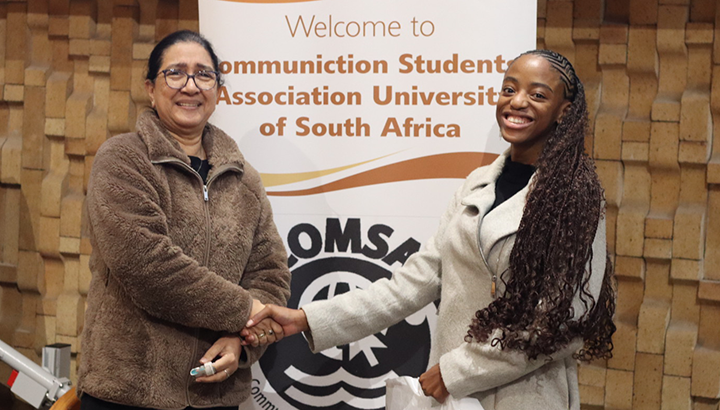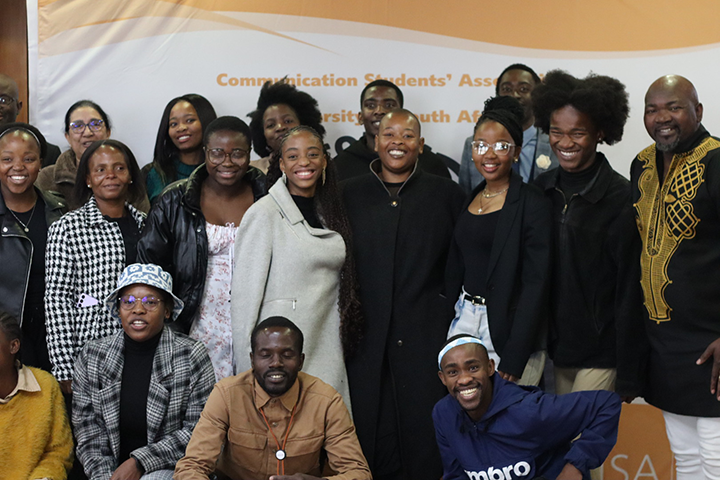News & Events
Lehlogonolo Sango takes the crown at 2025 COMSA Student Debate

Prof Khatija Khan and winner Lehlogonolo Sango
Lehlogonolo Sango emerged victorious at the 2025 Student Debate hosted by the Communication Students’ Association (COMSA) in partnership with Unisa's Department of Communication Science. The debate took place on 9 July at Senate Hall in the Winnie Madikizela-Mandela Building, Unisa main campus, under the thought-provoking theme: “The rise of artificial intelligence will lead to a net loss of jobs across industries”.
Sango's compelling and research-driven presentation highlighted the widening socio-economic gap caused by artificial intelligence (AI), its role in rising youth unemployment, and its potential to marginalise African languages and cultural content. Her questions on access, inequality, and digital literacy resonated deeply with both adjudicators and the audience.
The annual student debate, an important fixture on the COMSA calendar, aimed to stimulate critical engagement around AI’s impact in the Fourth Industrial Revolution (4IR), particularly its role in academic and workplace contexts. The event opened with a welcome address by COMSA Liaison Officer, Professor Khatija Khan, who introduced Dr Lehasa Moloi, the day’s facilitator, Professor Jose Mutangadura from Tshwane University of Technology, and Sehlako Mathebe of JohnSema Media as adjudicators.
Setting an inspirational tone for the day, poet and motivational speaker Sammy Mabitsi delivered an original poem on courage and motivation, energising the participants and audience. The debate featured two teams: the proposition, which supported the integration and benefits of AI in the 4IR society, and the opposition, which critiqued its broader implications. Arguments on both sides were strong, and students brought a range of perspectives informed by personal insights, academic research, and real-world observations.

Debate teams, organisers, speakers and adjudicators
Speaking for the proposition team, Maria Domingos maintained that AI is not here to replace humans but rather to assist them. “Artificial intelligence cannot exist in isolation; it needs human input. This is about integration, not elimination,” she argued. In contrast, Tshegofatso Nkosi of the opposition team expressed concern about AI’s growing influence in academic spaces. “Even students here at Unisa rely on AI to complete their assessments,” she said, adding that the technology encourages complacency among both students and lecturers.
While the event paused briefly to await additional participants, Moloi shared critical reflections on AI from an Afrocentric lens. He questioned the extent to which Africans adopt global technologies without adapting them to the continent’s socio-cultural context. “We should question the role of AI in our cultural practices and its relevance within African geopolitical realities,” he said, adding that excessive reliance on AI could lead to what he termed “psychological laziness.”.
Nqobile Mtimkulu returned to the proposition side with a strong statistical perspective, noting that AI has created over one million jobs globally since its introduction and significantly boosts productivity across sectors. However, it was Sango's well-researched critique that stirred the audience and earned her top honours. She argued that AI contributes to rising inequality by limiting access for underprivileged communities and threatening African languages and local content. “What happens to those who lack basic digital skills? How do we preserve our native languages? What about our continental knowledge systems?” she asked.
Look out for COMSA’s next event, the Media Dialogue on 17 September 2025. For more information, email comsa@unisa.ac.za or visit the COMSA Unisa Facebook page.
* By Collen Khorommbi, COMSA member
Publish date: 2025-09-04 00:00:00.0

